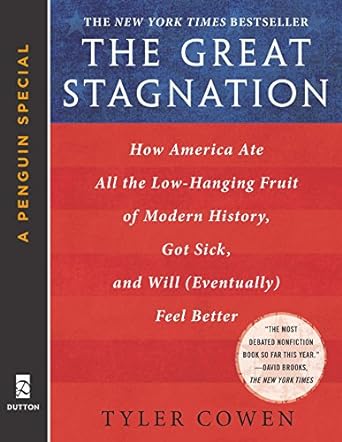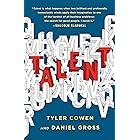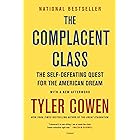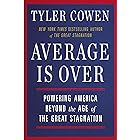| Kindle Price: | $14.99 |
| Sold by: | Penguin Group (USA) LLC Price set by seller. |
Your Memberships & Subscriptions

Download the free Kindle app and start reading Kindle books instantly on your smartphone, tablet, or computer - no Kindle device required.
Read instantly on your browser with Kindle for Web.
Using your mobile phone camera - scan the code below and download the Kindle app.





OK
 Audible sample Sample
Audible sample Sample 


The Great Stagnation: How America Ate All The Low-Hanging Fruit of Modern History, Got Sick, and Will (Eventually) Feel Better: A Penguin eSpecial from Dutton Kindle Edition
America has been through the biggest financial crisis since the great Depression, unemployment numbers are frightening, media wages have been flat since the 1970s, and it is common to expect that things will get worse before they get better. Certainly, the multidecade stagnation is not yet over. How will we get out of this mess? One political party tries to increase government spending even when we have no good plan for paying for ballooning programs like Medicare and Social Security. The other party seems to think tax cuts will raise revenue and has a record of creating bigger fiscal disasters that the first. Where does this madness come from?
As Cowen argues, our economy has enjoyed low-hanging fruit since the seventeenth century: free land, immigrant labor, and powerful new technologies. But during the last forty years, the low-hanging fruit started disappearing, and we started pretending it was still there. We have failed to recognize that we are at a technological plateau. The fruit trees are barer than we want to believe. That's it. That is what has gone wrong and that is why our politics is crazy.
In The Great Stagnation, Cowen reveals the underlying causes of our past prosperity and how we will generate it again. This is a passionate call for a new respect of scientific innovations that benefit not only the powerful elites, but humanity as a whole.
- LanguageEnglish
- PublisherDutton
- Publication dateJanuary 25, 2011
- Reading age18 years and up
- File size933 KB
Customers who bought this item also bought
Editorial Reviews
Review
“The most debated nonfiction book so far this year...As Cowen makes clear, many of this era’s technological breakthroughs produce enormous happiness gains, but surprisingly little economic activity.”—David Brooks, The New York Times
“One of the most talked-about books among economists right now.”—Renee Montagne, Morning Edition, NPR
“Tyler Cowen may very well turn out to be this decade’s Thomas Friedman.”—Kelly Evans, The Wall Street Journal
“Cowen's book...will have a profound impact on the way people think about the last thirty years.”—Ryan Avent, Economist.com
About the Author
Product details
- ASIN : B004H0M8QS
- Publisher : Dutton; 0 edition (January 25, 2011)
- Publication date : January 25, 2011
- Language : English
- File size : 933 KB
- Text-to-Speech : Enabled
- Screen Reader : Supported
- Enhanced typesetting : Enabled
- X-Ray : Enabled
- Word Wise : Enabled
- Sticky notes : On Kindle Scribe
- Print length : 128 pages
- Best Sellers Rank: #397,272 in Kindle Store (See Top 100 in Kindle Store)
- Customer Reviews:
About the author

Tyler Cowen (/ˈkaʊ.ən/; born January 21, 1962) is an American economist, academic, and writer. He occupies the Holbert L. Harris Chair of economics, as a professor at George Mason University, and is co-author, with Alex Tabarrok, of the popular economics blog Marginal Revolution. Cowen and Tabarrok have also ventured into online education by starting Marginal Revolution University. He currently writes a regular column for Bloomberg View. He also has written for such publications as The New York Times, The Wall Street Journal, Forbes, Time, Wired, Newsweek, and the Wilson Quarterly. Cowen also serves as faculty director of George Mason's Mercatus Center, a university research center that focuses on the market economy. In February 2011, Cowen received a nomination as one of the most influential economists in the last decade in a survey by The Economist. He was ranked #72 among the "Top 100 Global Thinkers" in 2011 by Foreign Policy Magazine "for finding markets in everything."
Bio from Wikipedia, the free encyclopedia.
Customer reviews
Customer Reviews, including Product Star Ratings help customers to learn more about the product and decide whether it is the right product for them.
To calculate the overall star rating and percentage breakdown by star, we don’t use a simple average. Instead, our system considers things like how recent a review is and if the reviewer bought the item on Amazon. It also analyzed reviews to verify trustworthiness.
Learn more how customers reviews work on Amazon-
Top reviews
Top reviews from the United States
There was a problem filtering reviews right now. Please try again later.
He raises interesting points about the productivity growth of the last 30 years: that, really, neither labor nor capital has gotten much richer, so maybe productivity didn't improve that much after all?; and that much of the productivity gains in recent years have come from producing the same amount (or close to it) with fewer people, rather than doing more with the same workforce.
And his thesis about economic growth being perhaps overstated...due to fast growth in sectors--education, health care, government--where expenditures are valued at cost rather than reflecting a market price...rings very true to me. He points out that schools today have MUCH better facilities than they did 40 years ago, and all of that shows up in published GDP numbers--but what is the true benefit of such? Or of highways, unnecessary doctor visits, etc.
His writing about the Internet, and its effect on GDP, also is insightful and important. That is, quality of life has improved in meaningful ways that are destructive to GDP: using wikipedia instead of buying a dictionary, posting on Internet bulletin boards rather than paying to go to the dance hall, etc. Certainly I would spend more than $20/month on movie theaters/rentals if Netflix weren't available. But it is, so I almost never go to the theater, and spend less on rentals than I would have 10 years ago. The immense value--if unmeasured--of the Internet means that GDP/income may be less relevant to quality of life than they used to be. However, our fiscal obligations can't be funded with improved quality of life, so reconciling a slower pace of economic growth with liabilities will be very difficult--especially given that, at present, we don't even really acknowledge the underlying problem. Cowen raises an interesting contrast with Europe, which--perhaps due to WWII--doesn't have the same experience with all their wants being fulfilled.
I have often thought about how different basic science was for the 'average' educated person during the Enlightenment...that a reasonably educated and curious person could do basic experiments and still incrementally advance general human knowledge of the world in which we live. And this essay basically says, yes, society benefited greatly from science's the low barrier to entry from the 1500s-1900s, but we've now fully depreciated the value of those discoveries made in more benighted times and are not coming up with new 'foundation' innovations on which future improvements in public good can be built. So "The Great Stagnation" isn't a stagnation in fiscal terms, but in scientific capital. It is also a failure inherent in the shift toward the privatization of scientific advancement and discovery...think drug patents, financial derivatives, etc.
I'm not sure I totally buy his arguments on how we are currently overestimating GDP in this country. But I can't disassemble and critique those arguments either, so it's a point of view I'll look for more reinforcement (or refutation of) in other texts. (A caveat: I'm relatively new to reading economics literature, so if you're read a tonne of books on this topic keep that bias of mine in mind.) I do however, intuitively agree that we are not truly seeing the full value of the internet yet, so perhaps this is the innovation on which future innovations in the public good can be based. I'm not sure Cowen feels like that's happening yet, but I feel like we're starting to see that.
While I don't think this is anywhere close to the definitive statement on our current economic malaise, I do think this quick read will give you good food for thought that supplements other books and articles.
How I score:
5 Stars: Transformative, I have seen 'the matrix' in a whole new light
4 Stars: Thought provoking, worth you time but read critically
3 Stars: Some interesting ideas but also some flaws, I probably finished it out of obligation
2 Stars: Meh, if I finished the book it was because I told someone I would
1 Star: #Fail, I didn't bother to finish it
Top reviews from other countries
- Our sense of how well off we are in the developed world is warped by 1) past growth that just isn’t there anymore and 2) the illusion that the rising value of our homes is increasing our wealth and we thus keep spending money we don’t actually have, because no actual value is being created.
- Real wealth and growth comes from scientific and technological breakthroughs that actually create value and cause the economy to rapidly expand and result in more people doing high-value work. Unfortunately, recently we haven’t had any major scientific and technological breakthroughs and the Internet businesses don’t actually contribute that much to the economy and they employ very few people compared to the size of the population.
- The education system is not working and our rates of illiteracy, high school dropouts, etc., are increasing. Furthermore, our society doesn’t value science and scientists and thus there is little incentive for our brightest minds to go into science when they could spend less effort, earn more money, and get higher social status elsewhere.
The book may seem like a downer, but Tyler Cowen is no pessimist. His message is that we absolutely can turn things around, we just need to start prioritizing correctly and get out of our comfort zones and stop being complacent. This message is still as relevant in 2021 as it was ten years ago.
Reading this book made me feel more motivated and energized. And I think that was exactly what Tyler Cowen was trying to accomplish by writing it — well done!
We had same situation earlier, however, history showed the betrayal of all the worries raised by the intelligentias then.
Looking back from today Cowen assesses past inventions and their subsequent successful commercialization as low hanging fruit, which to my opinion is misleading. Achieving innovation in the past was as difficult as it is today. Inventions have been made during all centuries all over the planet and it took entrepreneurs to turn those inventions into great innovations that produced income and improved the world we live in. All nations had their share here. But it is also true that great inventive nations can falter and lose their place at the top (e.g. the Roman Empire or China).
All other aliments mentioned by Cowen are those of any Western Nation: education and school curriculum, health care, government involvement.
What is true is that today we have a global market, global competition and a global continuous quest for new products, services and processes.
True is also, that the key for success in today`s postindustrial world today is knowledge and creativity.
All Asian nations have understood this since antiquity (at least since Confucius times) and they know, that and prosperity for the individual lies with social advancement and social advancement can be achieved with higher education aka knowledge.
While even former seemingly great innovative nations like Japan don't offer any answers on the above questions now (and probably never had them) other nations like Korea show some interesting concepts and planning. On a global scale there is no stagnation, only wealth is produced also in some other parts of the world and we have to accept the challenges to stay competitive.











